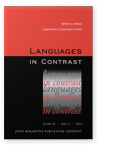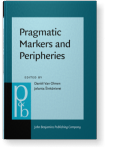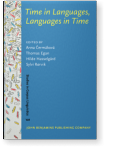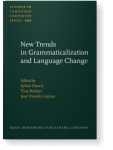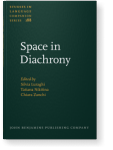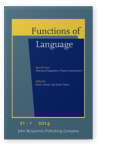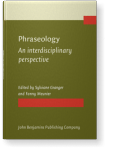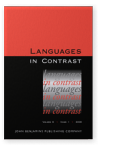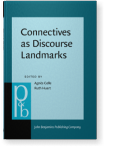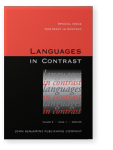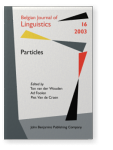Diana M. Lewis
List of John Benjamins publications for which Diana M. Lewis plays a role.
Journal
2021 Chapter 13. Pragmatic markers at the periphery and discourse prominence: The case of English of course Pragmatic Markers and Peripheries, Van Olmen, Daniël and Jolanta Šinkūnienė (eds.), pp. 351–382 | Chapter
This chapter argues that position interacts with discourse prominence in the development of pragmatic markers. A case study of the English marker of course traces its historical development over Late Modern English to its present-day usage at both left (LP) and right (RP) peripheries. It is… read more
2021 Then and now in English and French: Parallel patterns? Time in Languages, Languages in Time, Čermáková, Anna, Thomas Egan, Hilde Hasselgård and Sylvi Rørvik (eds.), pp. 181–200 | Chapter
English now and then and French maintenant and alors all exemplify the cross-linguistic tendency for temporal adverbs to grammaticalize into markers of rhetorical relations. This paper analyses the polysemy of these adverbs in a comparable corpus of written-to-be-spoken speeches and unscripted… read more
2018 Grammaticalizing connectives in English and discourse information structure New Trends in Grammaticalization and Language Change, Hancil, Sylvie, Tine Breban and José Vicente Lozano (eds.), pp. 135–157 | Chapter
The development of lexical expressions such as VP adverbs, matrix clauses and prepositional phrases into discourse markers and connectives expressing coherence relations has been well explored in the grammaticalization literature, under a broad view of grammaticalization, but there has been less… read more
2017 Source-Location ambiguity and incipient decline in the recent evolution of the English directional particle away Space in Diachrony, Luraghi, Silvia, Tatiana Nikitina and Chiara Zanchi (eds.), pp. 329–346 | Chapter
This chapter reports on a corpus-based investigation of the evolution of spatial away over the Modern English period in the light of recent work on the expression of motion events. Three observations are made: firstly, a directional-locative polysemy develops, secondly productivity seems to… read more
2014 Discourse patterns in the development of discourse markers in English Discourse linguistics: Theory and practice, Aijmer, Karin and Anita Fetzer (eds.), pp. 95–118 | Article
The role of discourse frequency in the development of two English connectives is explored, in the context of recent work emphasizing the role of syntagmatic relations in language change and suggesting that it is constructions, rather than lexical items, which grammaticalize. The development of… read more
2008 7. Adjective + Noun sequences in attributive or NP-final positions: Observations on lexicalization Phraseology: An interdisciplinary perspective, Granger, Sylviane and Fanny Meunier (eds.), pp. 111–125 | Article
Frequent Adjective + Noun sequences in the British National Corpus based on the most frequent ‘central’ adjectives were examined in their use as noun premodifiers and in other uses (predicative, adverbial, or with N being the head of a noun phrase). Hyphenated and non-hyphenated occurrences were… read more
2008 Review of Chuquet & Paillard (2006): Causalité et contrastivité. Etudes de corpus Languages in Contrast 8:1, pp. 130–133 | Review
2007 From temporal to contrastive and causal: The emergence of connective after all Connectives as Discourse Landmarks, Celle, Agnès and Ruth Huart (eds.), pp. 89–99 | Article
2005 Mapping adversative coherence relations in English and French Contrast in Context, Aijmer, Karin, Hilde Hasselgård and Stig Johansson (eds.), pp. 33–48 | Article
An approach to contrastive analysis is discussed that combines semantic mapping with analysis of comparable corpus data. Such an approach can help elucidate the many-to-many relationships between expressions or constructions of two languages. In turn, contrastive analysis is what enables us to… read more
2002 Rhetorical motivations for the emergence of discourse particles, with special reference to English of course Particles, Wouden, Ton van der, Ad Foolen and Piet Van de Craen (eds.), pp. 79–91 | Article
